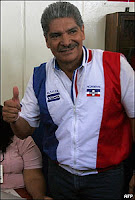Some travel safety tips
As a blogger writing in English about El Salvador, I often get questions about the safety of traveling in and about El Salvador. My usual advice is that travelers should rely heavily on Salvadorans they know and trust who can counsel them on when, where and how to go places in the country. I may also point people to some practical advice written by a "gringa in El Salvador" at El Salvador from the Inside titled Colorful Safety Guidelines for visiting El Salvador (or moving here) . Here's her tip about shoe choice: Tennis Shoes / Sneakers Men : leave expensive Adidas, Nike, and Air Jordan (or latest $150 craze) where they belong: at home in your closet, thousands of miles away from El Salvador. Buy a cheapo pair, and replace them with a standard brand that non-ostentatious people wear here after you arrive. It’s ok to look ‘cool’ at home, but here looking cool means “come steal my wallet.” Or the very sneakers you are wearing. People do wear con...
